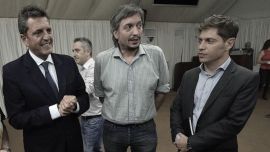If in the 1946 elections Corrientes was the only province not to vote Peronist, at this moment a Corrientes electing a new governor tomorrow could be the only part of Argentina where the audio scandal of kickbacks corroding the pinnacles of power is not at the top of the news. Tomorrow’s elections in the region will be given their preview in due course but the national scandal cannot be denied pride of place.
Only a few words here because this column’s slug limits the focus to the potential electoral impact without going into the authenticity of the voice messages or such questions as to whether or not they are friendly fire (and if so, from whom?).
For some analysts the scandal looms as a black swan and game-changer but there are still almost two months to go for the national midterms – the Buenos Aires Province elections are only a fortnight away with the impact of the scam standing to be much fresher but the voters there are a thick-skinned bunch when it comes to corruption – neither Greater Buenos Aires lumpenproletarians nor northern suburb glitterati nor inland farmers are inclined to place it at the top of their priorities.
But fatigue with graft could also extend to other provinces and other sectors – the prominence of the surname Menem in the ongoing scam brings back memories of how impervious the “voto cuota” electorate was to the umpteen scandals in the decade of the 1989-1999 Carlos Menem presidency (the same decade in which the phrase “It’s the economy, stupid” was coined).
While libertarian electoral strategy as identified with Presidential Chief-of Staff Karin Milei (now very much in the eye of the current storm) comes across as supremely aggressive, bullying its allies (as we saw in the May elections in this city), it is also in many ways defensive – President Javier Milei is basically trying to retain the 30 percent who voted for him in the first rounds of 2023 voting and the 56 percent in the run-off without much chance or interest where the 44 percent opting for his Peronist rival Sergio Massa are concerned, being quite happy to split the difference between those figures of 30 and 56 percent at 43 percent come October.
Starting with the 30 percent, one of the deepest dogmas of hard-core libertarians is that all politicians are rotten so that this universal truth also applying to their own does not come as much of a shock – just as Franklin Delano Roosevelt used to say about Central American dictators: “He may be a son of a bitch but he is our son of a bitch,” so Milei fans might find it gratifying to see their own people finally sharing in the loot. But the quarter of the 2023 electorate voting for Milei as the lesser evil rather than the greater good might think differently.
Just as Milei was a novelty at the start, a corruption scandal on his watch has a novelty value lacking in their dreary familiarity during the Menem or Kirchnerite years – this might make it a factor. But this columnist thinks that factors like the damage being done by interest rates doubling inflation will have a more corrosive impact without underestimating the credit gained from taming inflation, no matter how artificially.
But the Buenos Aires provincial election is next month (and week) and the midterms the month after that – Corrientes votes tomorrow. With the added weight of a gubernatorial election – only Santiago del Estero will have more at stake, voting for the works (governor, senators, national deputies, provincial legislators and municipal authorities) in October.
Siblings would seem to be the name of the game in contemporary Argentine politics because Javier and Karina Milei are mirrored in Corrientes by outgoing Radical Governor Gustavo Valdés aspiring to be succeeded by his brother Juan Pablo. Nor would this be anything new because between 2001 and 2017 we had the Colombi cousins Ricardo and Arturo (also Radical) alternating in power, not to mention two governors surnamed Romero Feris in the last two decades of the past century.
Ricardo Colombi (who prefers to call himself Horacio these days, perhaps to airbrush previous scandals) is in this fray at the head of Encuentro por Corrientes, one of the six fronts confronting the Vamos Corrientes of Juan Pablo Valdés, but opinion polls show him trailing the Peronist Martín Ascúa (Limpiar Corrientes) in the tussle for runner-up and a run-off spot – Valdés doubles either of them. The national ruling party La Libertad Avanza, whose candidate is the deputy Lisandro Almirón – imposed by Karina Milei when the maverick Peronist Senator Carlos Mauricio ‘Camau’ Espinola (now in league with Vamos Corrientes) could have garnered more instantaneous popularity – is struggling to reach double digits with rival libertarian list Partido Ahora headed by the journalist Carlos ‘Teke’ Romero chipping away at its votes. The left is represented by Cambiá Corrientes whose gubernatorial candidate is the Communist Sonia López with the fringe Partido de la Esperanza rounding off the list with the lawyer Adriana Vega.
In all probability this story is to be continued because Valdés only commands a third of the vote, sending him to a run-off on September 21 (which would give this space further opportunity to round out its Corrientes coverage). But the undecided could just top up Valdés over the 40 percent needed to ensure first-round victory although the current Zeitgeist of voter apathy would make it likelier for them to sit this one out
Next Saturday we will crunch the numbers of Corrientes gubernatorial voting as well as endeavour to squeeze in the results at legislative level but there will also be the “mother of all battles” – the election in Buenos Aires Province – to preview.




















Comments